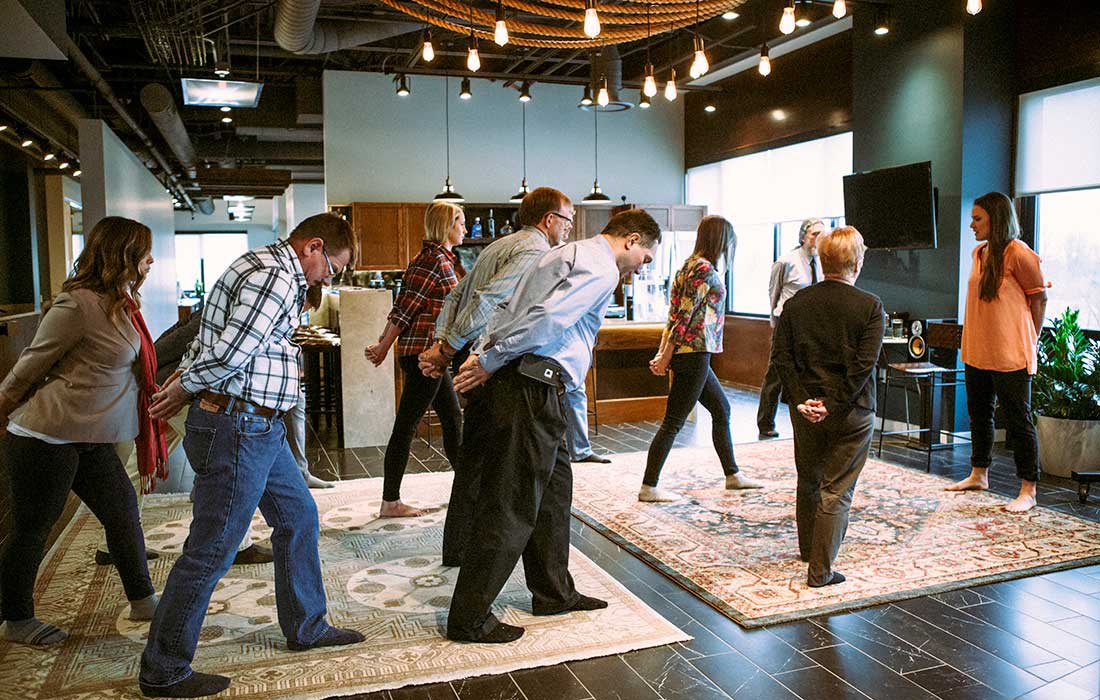
Culture
Entrepreneur Jayme Sweere Wants to Stop Your Stress
The local yoga expert founded StressedOutHumans.com to help professionals bring their bodies back to balance for a healthier lifestyle. Sit up straight and take it all in.
By Jenna DeJong
Jul 2018

A former basketball player and coach, Jayme Sweere used yoga and meditation to stay balanced at her desk job. Now she has helped eight organizations and counting through her workplace wellness consulting business.
Biz 417: What inspired StressedOutHumans.com?
Jayme Sweere: I worked at a yoga and meditation retreat center for a website called YogaInternational.com. I was there for three years working in marketing, business development and content creation. I learned a ton about yoga and meditation while simultaneously sitting in a cubicle. Having gone from being a coach and moving all day to sitting at a desk, it was hard on me. I developed what I will call lifestyle experiments. I would change or add a couple things that I learned from yoga to my own life. That’s how the techniques and programs in StressedOutHumans.com came to be.
Biz: What convinced you to start the business?
JS: Both as a coach and working with people individually as a personal trainer and yoga therapist, time and time again the things that were blocking someone from their goals were their habits. They were unable to change their habits because they were stressed out, which means they were functioning in fight-or-flight all the time. If everyone in an organization has the tools to calm their nervous system, it improves cognitive function, builds the skill of adaptability and creates environments where something new can be created.
Biz: How is StressedOutHumans.com different from other workplace wellness programs?
JS: Stressed Out Humans integrates ancient techniques of self-regulation and current biomechanics and neuroscience into the workplace environment, like meditative traditions where people were doing different experiments with their body. We teach ways of breathing and moving that cause physiological effects in the body, and [we] work with organizations to develop a workforce of individuals capable of expressing their unique genius by designing a lifestyle that supports peak human performance.
Biz: How can someone successfully change their habits?
JS: Usually when people try to change a habit, they try to change a lot of habits at once. Sustainable change is incremental and really targeted at the weakest link. What’s the one thing you can change that will change a lot of things? Focus on that.


Biz: What are some ways you teach businesspeople to be more relaxed?
JS: Our curriculum works with the breath and learning to regulate your own energy more than anything. If you’re depleted, getting more oxygen to your brain will help rejuvenate your system. It’s learning how to breathe and align your body so you’re not putting yourself in a repetitive position that causes strain long-term, like burnout and disease. A common example of unaddressed imbalance is a forward positioning of the head because of technology. The head is literally not on the shoulders, and it’s really destabilizing, so there are certain techniques you can do that correct that.
Biz: How do you adapt your approach to different workplaces?
JS: Most jobs have repetitive actions, so I look at these actions, and I create and teach a practice that will help counter those movements, bringing the body back to alignment and balance. If a factory worker is standing or reaching forward, we’d work on different ways to counter that throughout the day. There are different actions within their job, and as a yoga therapist I can see that those repetitive actions have taken a large toll on their body over time.
Biz: How long do you typically work with businesses?
JS: It is really tailored to the organization and what they are looking for. If they have a robust wellness program, I could just do a lunch and learn that they would bring me in to talk specifically about these things. One of the huge benefits of even one session is then the organization has a shared language around these tools of self-regulation.
Biz: What are some of the benefits of incorporating these techniques into your work life?
JS: Implementing these techniques is about finding balance, so when you learn and start to practice these, you’ll have lifelong tools to bring yourself back to balance. You’re able to respond to life instead of react. In my experience, these simple breathing and movement techniques have allowed me to respond to what is actually happening in my life and notice opportunity all around me, instead of being stuck in habit and fear of change.
Biz: What are some ways you teach businesspeople to be more relaxed?
JS: Our curriculum works with the breath and learning to regulate your own energy more than anything. If you’re depleted, getting more oxygen to your brain will help rejuvenate your system. It’s learning how to breathe and align your body so you’re not putting yourself in a repetitive position that causes strain long-term, like burnout and disease. A common example of unaddressed imbalance is a forward positioning of the head because of technology. The head is literally not on the shoulders, and it’s really destabilizing, so there are certain techniques you can do that correct that.
Biz: How do you adapt your approach to different workplaces?
JS: Most jobs have repetitive actions, so I look at these actions, and I create and teach a practice that will help counter those movements, bringing the body back to alignment and balance. If a factory worker is standing or reaching forward, we’d work on different ways to counter that throughout the day. There are different actions within their job, and as a yoga therapist I can see that those repetitive actions have taken a large toll on their body over time.
Biz: How long do you typically work with businesses?
JS: It is really tailored to the organization and what they are looking for. If they have a robust wellness program, I could just do a lunch and learn that they would bring me in to talk specifically about these things. One of the huge benefits of even one session is then the organization has a shared language around these tools of self-regulation.
Biz: What are some of the benefits of incorporating these techniques into your work life?
JS: Implementing these techniques is about finding balance, so when you learn and start to practice these, you’ll have lifelong tools to bring yourself back to balance. You’re able to respond to life instead of react. In my experience, these simple breathing and movement techniques have allowed me to respond to what is actually happening in my life and notice opportunity all around me, instead of being stuck in habit and fear of change.












